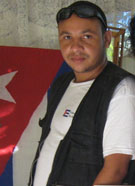Roberto de Jesús Guerra Pérez, a Havana-based independent journalist, sent an e-mail message this morning to his “brothers, colleagues, and organizations that protect and watch over press freedom around the world” announcing that he had been released from police custody after a four-day detention. In his e-mail, titled “Thanks to you and to your demands, I am at it again,” Guerra Pérez detailed the ordeals of his arrest.
The journalist said he was taken into custody during a “massive police operation” on the afternoon of March 4, as neighbors stood by watching. Two agents of Cuba’s secret police drove him to a local police station, where he was placed in a cell with 15 other men.
Soon after his arrival, Guerra Pérez was transferred to a second police station in Havana. There, State Security agents informed him that he would be questioned in his capacity as an independent journalist on the appearance around the Old Havana neighborhood of posters that said “Down with Fidel.”
Agents interrogated Guerra Pérez eight times over the course of four days, he said, with each interrogation lasting between one and a half and three hours. Interrogators asked Guerra Pérez again and again to name the people responsible for the posters. “I told them that I did receive a lot of information about the posters which had been hung up […] but that because of my ethics I could not tell them who the guilty person or who my sources were, even if I did know,” Guerra Pérez wrote.
The journalist was released at 6 p.m. on Wednesday. From his e-mail, it is not clear whether authorities pressed charges. He did, however, highlight that prison authorities denied him medication for pulmonary emphysema, hypertension, and severe skin allergies.
Minutes after sending his e-mail, Guerra Pérez sent a second message with three stories attached that detailed police repression during different dissident activities in Havana. He explained that he had been unable to send them earlier due to his arrest.
The journalist’s wife told CPJ earlier this week that in 2008, her husband was detained and released 50 times, and warned repeatedly that he must stop working as an independent journalist. Other Havana-based journalists and human rights advocates said short detentions have become a common means of intimidating dissidents and independent journalists.
Twenty-one independent reporters and editors are currently jailed in Cuba, which is the second worse jailer of journalists in the world after China. Twenty of them have been held in inhumane conditions since the massive crackdown on Cuba’s dissidence and independent press in March 2003.
